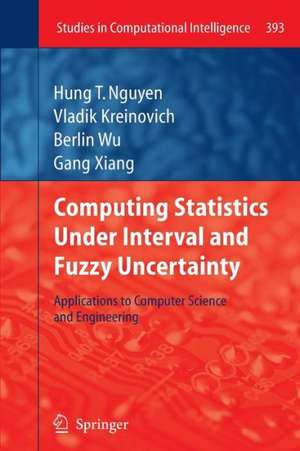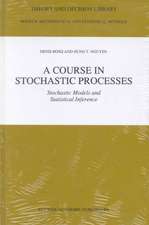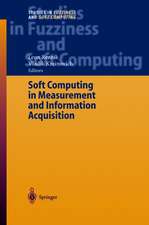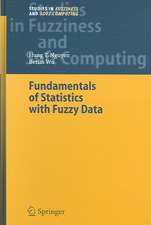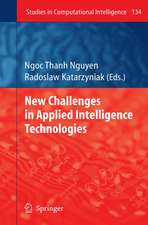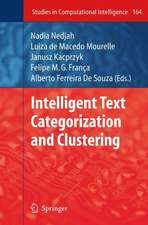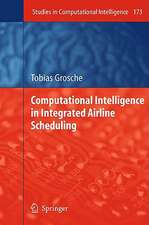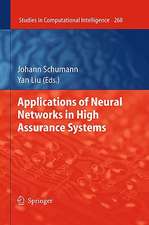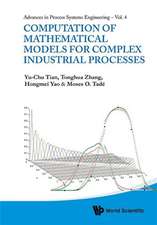Computing Statistics under Interval and Fuzzy Uncertainty: Applications to Computer Science and Engineering: Studies in Computational Intelligence, cartea 393
Autor Hung T. Nguyen, Vladik Kreinovich, Berlin Wu, Gang Xiangen Limba Engleză Paperback – 26 ian 2014
Most algorithms for estimating such statistics assume that the sample values are exact. In practice, sample values come from measurements, and measurements are never absolutely accurate. Sometimes, we know the exact probability distribution of the measurement inaccuracy, but often, we only know the upper bound on this inaccuracy. In this case, we have interval uncertainty: e.g. if the measured value is 1.0, and inaccuracy is bounded by 0.1, then the actual (unknown) value of the quantity can be anywhere between 1.0 - 0.1 = 0.9 and 1.0 + 0.1 = 1.1. In other cases, the values are expert estimates, and we only have fuzzy information about the estimation inaccuracy.
This book shows how to compute statistics under such interval and fuzzy uncertainty. The resulting methods are applied to computer science (optimal scheduling of different processors), to information technology (maintaining privacy), to computer engineering (design of computer chips), and to data processing in geosciences, radar imaging, and structural mechanics.
| Toate formatele și edițiile | Preț | Express |
|---|---|---|
| Paperback (1) | 944.44 lei 6-8 săpt. | |
| Springer Berlin, Heidelberg – 26 ian 2014 | 944.44 lei 6-8 săpt. | |
| Hardback (1) | 950.57 lei 6-8 săpt. | |
| Springer Berlin, Heidelberg – 3 noi 2011 | 950.57 lei 6-8 săpt. |
Din seria Studies in Computational Intelligence
- 50%
 Preț: 264.48 lei
Preț: 264.48 lei - 20%
 Preț: 1149.72 lei
Preț: 1149.72 lei - 20%
 Preț: 979.38 lei
Preț: 979.38 lei - 20%
 Preț: 1442.03 lei
Preț: 1442.03 lei - 20%
 Preț: 168.78 lei
Preț: 168.78 lei - 18%
 Preț: 1104.09 lei
Preț: 1104.09 lei - 20%
 Preț: 565.38 lei
Preț: 565.38 lei - 20%
 Preț: 644.49 lei
Preț: 644.49 lei - 20%
 Preț: 1039.99 lei
Preț: 1039.99 lei - 20%
 Preț: 1567.29 lei
Preț: 1567.29 lei - 20%
 Preț: 638.76 lei
Preț: 638.76 lei - 20%
 Preț: 652.66 lei
Preț: 652.66 lei - 20%
 Preț: 985.95 lei
Preț: 985.95 lei - 20%
 Preț: 983.49 lei
Preț: 983.49 lei - 20%
 Preț: 982.67 lei
Preț: 982.67 lei - 20%
 Preț: 1157.08 lei
Preț: 1157.08 lei - 20%
 Preț: 1433.84 lei
Preț: 1433.84 lei - 20%
 Preț: 1034.27 lei
Preț: 1034.27 lei - 20%
 Preț: 1039.99 lei
Preț: 1039.99 lei - 20%
 Preț: 1038.35 lei
Preț: 1038.35 lei - 18%
 Preț: 2482.01 lei
Preț: 2482.01 lei - 20%
 Preț: 981.84 lei
Preț: 981.84 lei - 20%
 Preț: 1157.08 lei
Preț: 1157.08 lei - 20%
 Preț: 1155.44 lei
Preț: 1155.44 lei - 20%
 Preț: 1035.10 lei
Preț: 1035.10 lei - 20%
 Preț: 1449.39 lei
Preț: 1449.39 lei - 18%
 Preț: 1393.16 lei
Preț: 1393.16 lei - 18%
 Preț: 1116.60 lei
Preț: 1116.60 lei - 20%
 Preț: 1031.80 lei
Preț: 1031.80 lei - 20%
 Preț: 1000.67 lei
Preț: 1000.67 lei - 20%
 Preț: 1037.55 lei
Preț: 1037.55 lei - 20%
 Preț: 1265.99 lei
Preț: 1265.99 lei - 20%
 Preț: 1032.63 lei
Preț: 1032.63 lei - 20%
 Preț: 981.05 lei
Preț: 981.05 lei - 20%
 Preț: 1161.15 lei
Preț: 1161.15 lei - 20%
 Preț: 1153.80 lei
Preț: 1153.80 lei - 20%
 Preț: 1051.45 lei
Preț: 1051.45 lei - 20%
 Preț: 1155.44 lei
Preț: 1155.44 lei - 20%
 Preț: 1157.91 lei
Preț: 1157.91 lei - 20%
 Preț: 1448.60 lei
Preț: 1448.60 lei - 18%
 Preț: 998.33 lei
Preț: 998.33 lei - 20%
 Preț: 990.03 lei
Preț: 990.03 lei - 20%
 Preț: 1048.16 lei
Preț: 1048.16 lei - 20%
 Preț: 1274.98 lei
Preț: 1274.98 lei - 20%
 Preț: 986.74 lei
Preț: 986.74 lei - 20%
 Preț: 1040.98 lei
Preț: 1040.98 lei - 20%
 Preț: 936.82 lei
Preț: 936.82 lei - 20%
 Preț: 1164.44 lei
Preț: 1164.44 lei - 20%
 Preț: 1446.94 lei
Preț: 1446.94 lei - 20%
 Preț: 1037.55 lei
Preț: 1037.55 lei
Preț: 944.44 lei
Preț vechi: 1151.77 lei
-18% Nou
Puncte Express: 1417
Preț estimativ în valută:
180.88€ • 186.36$ • 151.52£
180.88€ • 186.36$ • 151.52£
Carte tipărită la comandă
Livrare economică 22 februarie-08 martie
Preluare comenzi: 021 569.72.76
Specificații
ISBN-13: 9783642445705
ISBN-10: 3642445705
Pagini: 444
Ilustrații: XII, 432 p.
Dimensiuni: 155 x 235 x 23 mm
Greutate: 0.62 kg
Ediția:2012
Editura: Springer Berlin, Heidelberg
Colecția Springer
Seria Studies in Computational Intelligence
Locul publicării:Berlin, Heidelberg, Germany
ISBN-10: 3642445705
Pagini: 444
Ilustrații: XII, 432 p.
Dimensiuni: 155 x 235 x 23 mm
Greutate: 0.62 kg
Ediția:2012
Editura: Springer Berlin, Heidelberg
Colecția Springer
Seria Studies in Computational Intelligence
Locul publicării:Berlin, Heidelberg, Germany
Public țintă
ResearchCuprins
Part I Computing Statistics under Interval and Fuzzy Uncertainty: Formulation of the Problem and an Overview of General Techniques Which Can Be Used for Solving this Problem.- Part II Algorithms for Computing Statistics Under Interval and Fuzzy Uncertainty.- Part III Towards Computing Statistics under Interval and Fuzzy Uncertainty: Gauging the Quality of the Input Data.- Part IV Applications.- Part V Beyond Interval and Fuzzy Uncertainty.
Recenzii
From the reviews:
“This book is a research exposition by Kreinovich and coworkers. … The main goal is to present algorithms for computation of statistical characteristics (like variance) but under interval and fuzzy uncertainty of the available data. In this book, fuzzy uncertainty is reduced to interval uncertainty by alpha-cutwise consideration of (convex) fuzzy uncertainty. … For increase of readability, mathematical proofs are presented always at the end of the chapters.” (Wolfgang Näther, Zentralblatt MATH, Vol. 1238, 2012)
“This book is a research exposition by Kreinovich and coworkers. … The main goal is to present algorithms for computation of statistical characteristics (like variance) but under interval and fuzzy uncertainty of the available data. In this book, fuzzy uncertainty is reduced to interval uncertainty by alpha-cutwise consideration of (convex) fuzzy uncertainty. … For increase of readability, mathematical proofs are presented always at the end of the chapters.” (Wolfgang Näther, Zentralblatt MATH, Vol. 1238, 2012)
Textul de pe ultima copertă
In many practical situations, we are interested in statistics characterizing a population of objects: e.g. in the mean height of people from a certain area.
Most algorithms for estimating such statistics assume that the sample values are exact. In practice, sample values come from measurements, and measurements are never absolutely accurate. Sometimes, we know the exact probability distribution of the measurement inaccuracy, but often, we only know the upper bound on this inaccuracy. In this case, we have interval uncertainty: e.g. if the measured value is 1.0, and inaccuracy is bounded by 0.1, then the actual (unknown) value of the quantity can be anywhere between 1.0 - 0.1 = 0.9 and 1.0 + 0.1 = 1.1. In other cases, the values are expert estimates, and we only have fuzzy information about the estimation inaccuracy.
This book shows how to compute statistics under such interval and fuzzy uncertainty. The resulting methods are applied to computer science (optimal scheduling of different processors), to information technology (maintaining privacy), to computer engineering (design of computer chips), and to data processing in geosciences, radar imaging, and structural mechanics.
Most algorithms for estimating such statistics assume that the sample values are exact. In practice, sample values come from measurements, and measurements are never absolutely accurate. Sometimes, we know the exact probability distribution of the measurement inaccuracy, but often, we only know the upper bound on this inaccuracy. In this case, we have interval uncertainty: e.g. if the measured value is 1.0, and inaccuracy is bounded by 0.1, then the actual (unknown) value of the quantity can be anywhere between 1.0 - 0.1 = 0.9 and 1.0 + 0.1 = 1.1. In other cases, the values are expert estimates, and we only have fuzzy information about the estimation inaccuracy.
This book shows how to compute statistics under such interval and fuzzy uncertainty. The resulting methods are applied to computer science (optimal scheduling of different processors), to information technology (maintaining privacy), to computer engineering (design of computer chips), and to data processing in geosciences, radar imaging, and structural mechanics.
Caracteristici
Recent advances in Computing Statistics under Interval and Fuzzy Uncertainty Presents various Applications to Computer Science and Engineering
